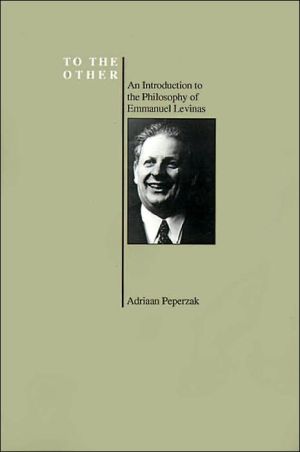

 |

|

The average rating for To the Other: An Introduction to the Philosophy of Emmanuel Levinas based on 2 reviews is 2 stars.
Review # 1 was written on 2013-08-18 00:00:00 Nusrul Khan Nusrul KhanPeperzak provides a rather thorough introduction to Levinas' philosophy, clarifying several ambiguities in Levinas' texts that reappear in the secondary literature, though to be honest, Peperzak's clarifications were often very disappointing. If this is indeed what Levinas believed, and I think Peperzak makes strong cases for believing it to be the case, then I am much less enamored with Levinas' philosophy. Nonetheless, this is a useful tool which includes an important essay, "Philosophy and the Idea of the Infinite" (translated by Alphonso Lingis, commentary by Peperzak), and a lengthy commentary on TOTALITY AND INFINITY. Based on the conclusions and arguments, I would have rated this book much lower, but the commentary is thorough and helpful for researchers, so I have to acknowledge the scholarship. |
Review # 2 was written on 2019-11-26 00:00:00 Michael Blazevich Michael BlazevichDavid Stove's book is irreverent which may not be a bad thing, but irreverence does not in itself lead us closer to the truth. I have long had an aversion to linguistic analysis when its goal seems to be to produce an increase in skepticism rather than a decrease in error. Even the original chapter titles, "Neutralising success words", "Sabotaging logical expressions" belong more to a popular book on straight and crooked thinking than a serious effort to analyse the substance of the arguments of Popper,and his opponents Kuhn, Lakatos and Feyerabend. It is a big call for David Stove to purport, in particular, that Karl Popper is an irrationalist and that he saw no progress in science. It even borders on the ridiculous to brush off Popper's intense interest in probability arguments. Popper did turn his back on conventional empiricism, for Popper we have to know something before we can learn anything. David Miller makes the point that "Hume's problem does not even arise for guesses" which sums up Popper's response to logical issues in induction. The conjectural component of Popper's approach cannot be underrated. Good scientific theories explain more phenomena, they predict more precisely, they articulate with other scientific theories and they stand up to tests. David Stove is going further in trying also to justify them with arguments that critical rationalists have found wanting. |
CAN'T FIND WHAT YOU'RE LOOKING FOR? CLICK HERE!!!